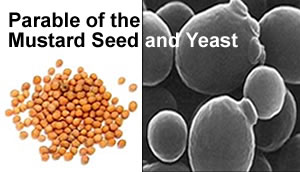
2 Samuel 7:1-17; Luke 1:30-33; Luke 13:18-21
The books of Samuel tell the story of radical transformation in the life of Israel. The loosely associated tribes want to be like their neighboring peoples, they want a king, not direct rule by God. Elohim acquiesces, warning them of the good and hard that come with human rule. Following a bad king, Saul, David comes to reign: a golden age. It’s in that moment, that God promises (in today’s text) that there will be a future leader, a descendent of David, who will be the true leader: the chosen one, or Messiah.
Luke, tells his gospel version of the life of Jesus for Greek-speaking people, who were primarily Gentile, or non-Jewish. Today’s gospel sections lay the groundwork for seeing Jesus as that Messiah, and include some parables about his reign. David has won his battles on his road to becoming king. Once anointed and established, he settles in, recognizing that he needs to establish the house of the Lord, to construct a permanent, unifying sacred space to replace the tabernacle of the itinerant and disparate tribes. Where
David sees a clear path of architectural plans, a sky-reaching edifice and unity; God speaks to him through the prophet turning his thinking upside down. God will not settle for a house built by human hands, and asserts that the Divine One will build David into a house. Talk moves from stones and mortar to loins and genetic lines. How does the Lord reveal himself? How does she unify the people through worship? David doesn’t seem to know what he’s getting into. One has to ask if we know any better in our own pursuit of God today.
Luke asserts that Jesus is the one to continue the house of David, to further the line, to ultimately been the messianic one who will establish God’s reign in the world. Yet such militant language and metaphor makes us think of armies and wars, battles and empires. Jesus speaks rather of seeds and single-celled microorganisms. He speaks of paradox and subversion, a different way of seeing and being. Is there any surprise that we struggle to recognize the coming of the kingdom? Is it any surprise that those in his day didn’t understand his nonviolent, peaceful authority?
Questions for the Practice of Examen & Contemplation
- These historical texts flesh out the theological paradox around God’s notion of kingship, leadership and vocation. The texts are both about the messiah (the anointed one) and all those anointed to leadership…so by extension all those who follow Jesus as teacher:: us! Where do you see the power and authority of Jesus in your life?; in our world? Is it straight-forward or paradoxical? What does that mean for you in your daily life, hopes and frustrations?
- The author of the pastoral letter sent to the Hebrews writes;
“1faith is the assurance of things hoped for, the conviction of things not seen. 2 Indeed, by faith our ancestors received approval. 3By faith we understand that the worlds were prepared by the word of God, so that what is seen was made from things that are not visible.” (Hebrews 11:1-3)
In your faith journey how do you experience the power or kingdom of God in the world? How do you dream of experiencing it? Why is there a difference? Talk to God about your frustrations or doubts.